Save the Humans
Individuals who made a difference
There are some who stand out as leaders because their work around a cause changed history. You too can be one of those people. Here are just a few examples of people who decided to take the chance and stand up for their beliefs. Each person’s fight is unique, along with the obstacles they faced. The courage, passion and determination of people throughout history can be a strong propelling force for us today.
How will you be part of the solution to save humans?
Radical Thinking: Nicolaus Copernicus
In some circles, Nicolaus Copernicus is regarded as the father of modern astrology.

Nicolaus Copernicus
In a time when new ideas and theories could get you killed, Copernicus dispelled the 2000-year-old belief that the Earth is the centre of the universe. In the 1500s, the belief that the Earth was a stationary sphere in the centre of the universe was as accepted as our current understanding is – Copernicus’ theory that it wasn’t was considered radical. He took Ptolemy and Aristotle’s work and developed his own complex model combining mathematics, physics and cosmology. His model used astronomical observations and mathematical formulas to show that the sun was the center of our system and that Earth orbited around it.
Though his theory was viewed as revolutionary and met with some controversy, Copernicus was not the first astronomer to propose such a concept. Copernicus had delayed publishing his work out of fear of the Roman Catholic Church, but at urging from peers he did so. His report did incense the Roman Catholic Church, for his model was considered contrary to the Church’s teachings. The Roman Catholic Church adamantly supported the Earth-based solar system theory. Copernicus’s second book on the topic, De revolutionibus orbium coelestium, was banned by the Church – and remained on the list of forbidden reading material for more than 200 years (1616 to 1835).
Although he was met with great criticism and obstacles, the work of Copernicus was essential and was the foundation of work by astronomers for centuries.
Selflessness: Mohandas (Mahatmas) Gandhi

Mohandas Gandhi
Mohandas Gandhi was a major political and spiritual leader who fought in India’s Independence Movement. He pioneered the use of peaceful resistance through mass non-violent civil disobedience, or satyagraha. His activism continued for more than 30 years until his death in 1948.
Gandhi began his activism trying to eradicate the discrimination of Indians in South Africa – but he spent the majority of his life fighting for the unification of Hindus and Muslims in India and an India free from British rule. As leader of the Indian National Congress, Gandhi negotiated with the politicians about the possibility of Indian independence. His belief in nonviolent action was his strength and lesson to the world. He was jailed for many of his actions and struggled against discrimination and poverty in his goal to give Indians social and economic freedom.
Gandhi led a massive two-year non cooperation movement in India against the British Government: people gave up their titles, boycotted educational institutions, the courts, government service, foreign goods and elections; and refused to pay taxes. The united action, sparked by Gandhi, shook the British Government to the core.
First they ignore you, then they laugh at you, then they fight you, then you win. – Mahatmas Gandhi[42. www.brainyquote.com]
It was the strength of his messages and the extremes he took upon himself that earned him widespread respect. In 1943, upset by the terror and violence throughout India, Gandhi began a fast that lasted 21 days. On August 15, 1947, the British Indian Empire was dissolved and India became the two states of India and Pakistan. After India’s independence, Gandhi’s work to stop the Hindu-Muslim conflict in Bengal led to his assassination in 1948.
The moral influence of his personality, teachings and non-violent resistance went beyond India and inspired many.
Leading the Charge: Martin Luther King Jr.

Martin Luther King Jr. was awarded the Nobel Peace Prize in 1964
Martin Luther King Jr. was a Baptist minister whose non-violent activism led the Civil Rights Movement in the United States from the mid-1950s until his death in 1968. Martin Luther King Jr. spoke more than 2,500 times in support of the Civil Rights Movement.[43. Martin Luther King Jr. – Biography.” www.nobelprize.org]
King led the 1955 Montgomery citywide bus boycott following the arrest of Rosa Parks. The boycott lasted 382 days: during which time King’s home was attacked, he was arrested and abused. It was the beginning of years of radical demonstrations and confrontations. In 1957, King became one of the founding members of the Southern Christian Leadership Conference to seek civil rights reform, using the power and influence of the black churches.
Inspired by the actions of Gandhi, King went after change through non-violent but very visible public actions. He organized and attended mass meetings, non-violent demonstrations and protests, and lectured in support of civil rights across America. King earned national notoriety as the “leader” of the Civil Rights Movement in the United States.
Nonviolent direct action seeks to create such a crisis and foster such a tension that a community, which has constantly refused to negotiate, is forced to confront the issue. – Martin Luther King Jr.[44. Encyclopaedia Britannica’s Guide to Black History. “King, Martin Luther, Jr. The letter from the Birmingham jail.” www.britannica.com].
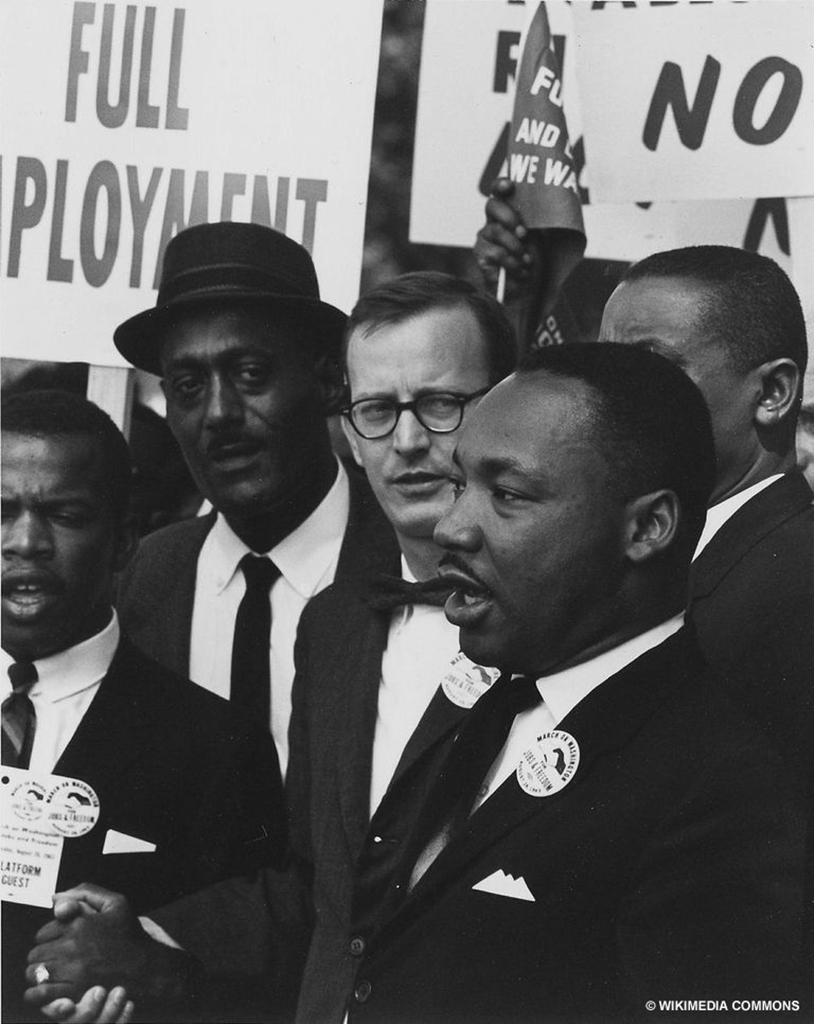
Martin Luther King Jr. attending a civil rights march on Washington, D.C
On August 28, 1963, King gave his famous “I Have a Dream speech” at a march in Washington that drew more than 200,000 people. African-Americans began standing up for their rights in civil actions across America – the public started to listen. Through his activism, King played a pivotal role in ending the legal segregation of African-American citizens in the South and other areas of the nation, starting with the Civil Rights Act of 1964 and the Voting Rights Act of 1965. King received the Nobel Peace Prize in 1964, among several other honors. King began to expand his work to other cities in America until his assassination in 1968.
It should be recognized that the revolution of the Civil Rights Movement was led by King – but was the result of the millions of people, of all colours, across America who stood up and refused to be ignored.
Saving the Planet
Saving Sharks: Rob Stewart
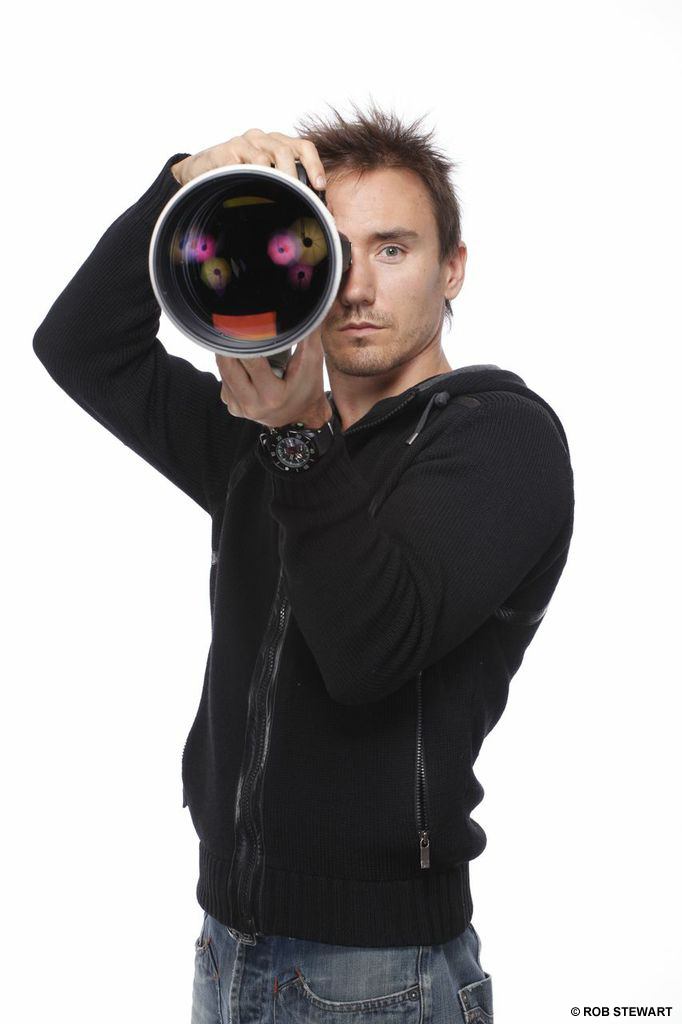
Rob Stewart caught the attention of environmentalists and the public with his multi award-winning movie Sharkwater in 2007. The film brought the issue of shark finning from obscurity to high-profile news.
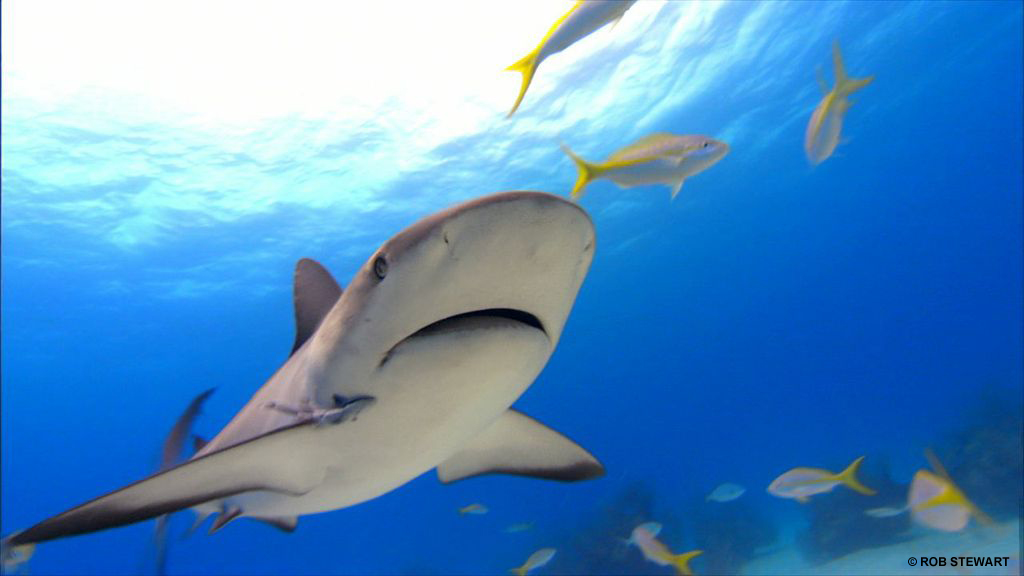
Underwater still footage from Rob Stewart`s first documentary Sharkwater
Exposing the behind-the-scenes shark-fin industry put Rob in dangerous, life-threatening situations and health emergencies such as – tuberculosis, dengue fever, flesh-eating disease and West Nile virus. While filming the documentary on sharks, his cameras captured corruption, espionage, attempted murder charges and mafia rings, forcing Stewart and his crew to become part of the story.
The film has played a significant role in shark finning bans around the globe. After more than 100 million people experienced Sharkwater, the world took on the cause: dozens of nonprofits formed, millions of dollars were raised on behalf of sharks and government policy started changing. Today, 65 countries have banned shark finning, massive shark sanctuaries have been created and everyone, from kids to celebrities, are rallying for shark protection.
Saipan
Inspired by Sharkwater, sixth grade students at San Vicente School on the island of Saipan, in the Northern Mariana Islands, Micronesia wrote letters to their government representatives and senators to ask for their support on a law to ban shark finning. They also utilized social networking websites like Facebook to ask people around the world to support them in their mission to protect Saipan’s sharks. On January 27, 2011, the Northern Mariana Islands became the second place in the world to entirely ban the possession, sale and trade of shark fins!
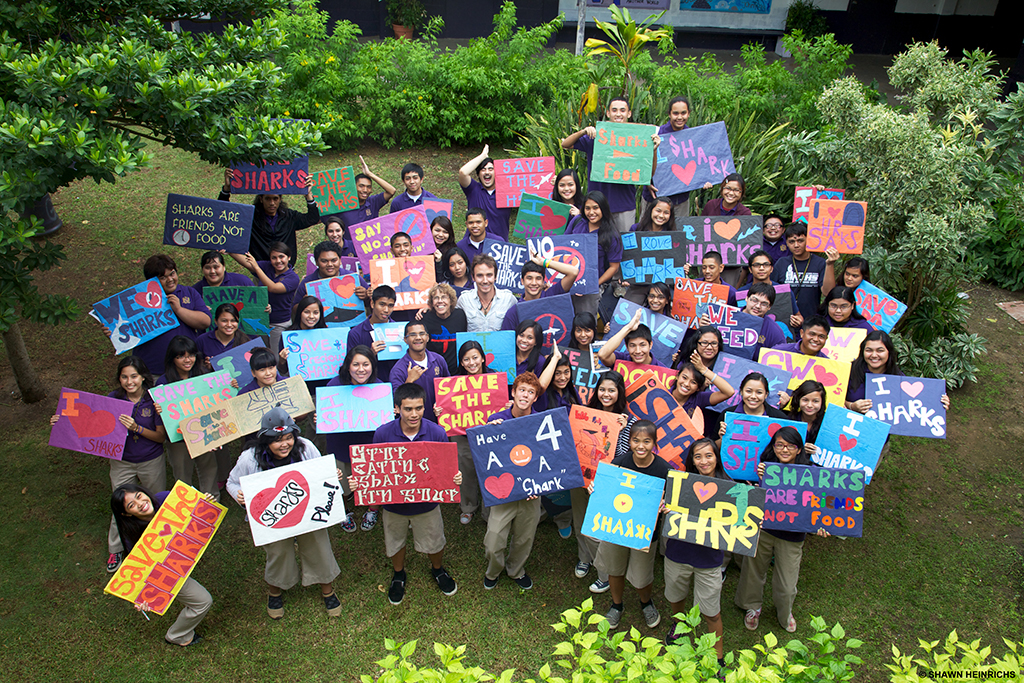
San Vicente grade 6 students with Rob Stewart on the island of Saipan
Sharkwater resulted in massive change for sharks, brought an incredibly passionate team together, and created United Conservationists, a revolutionary non-government organization committed to inspiring and enabling the same types of successes on a much broader scale.[45. United Conservationists. “Our History.” www.unitedconservationists.org] By educating the public, making conservation accessible to everyone, enabling people to get involved, and showing them how, United Conservationists inspires children and adults all over the world.
Climate Crusader: Felix Finkbeiner
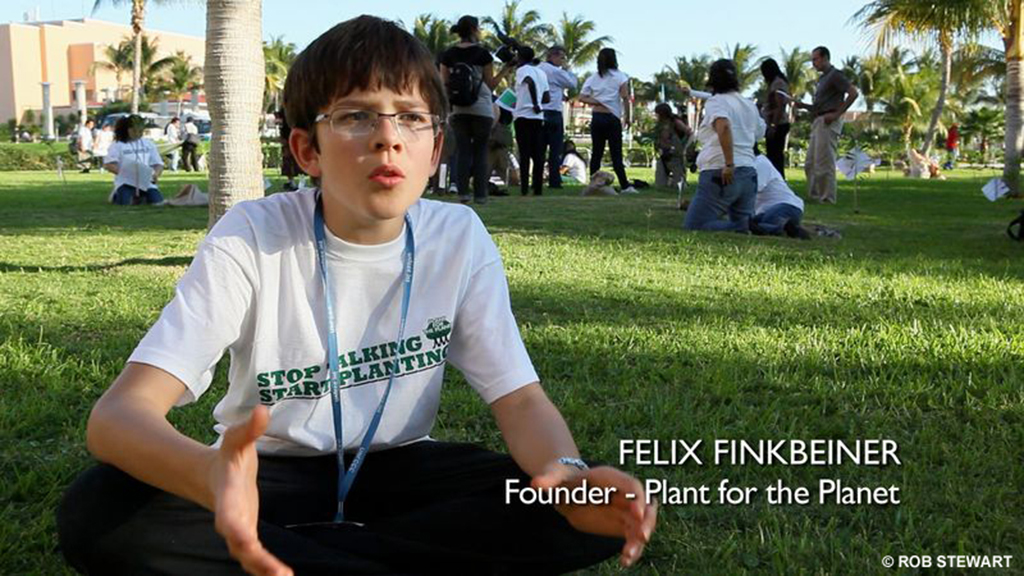
Felix Finkbeiner founder of Plant-for-the-planet
Youth activist and author Felix Finkbeiner has reached eco superstar status in his early teens. His goal was for children to fight climate change by planting one million trees in every country worldwide to help offset global carbon emissions, and to educate other children about climate justice.
At the age of nine, Finkbeiner founded the environmental organization, Plant-for-the-Planet, in Germany in 2007. Its goal to plant one million trees in Germany has been achieved, and the organization has branched out around the world in 131 countries with more than 100,000 youth activists involved.
Finkbeiner was a member of the 2009 United Nations Environment Programme (UNEP) Tunza Junior Board, representing Europe, and in 2011, launched the International Year of the Forests. In a speech to the United Nations his message to the diplomats was simple: ‘Stop talking and start planting‘, which turned into a global campaign to tell the world that talking alone is not going to make a difference and that now is the time for action.
While attending COP16, Finkbeiner planted a tree on the conference centre lawn for every country in attendance. The United Nations Environment Programme (UNEP) handed over the management of their Billion Tree Campaign to Plant-for-the-Planet to allow the campaign to continue as a supportive element in their own planting initiatives.[46. United Nations Environment Programme. News Centre. “UNEP Billion Tree Campaign Hands Over to the Young People of the Plant-for-the-Planet Foundation.” Dec. 7, 2011. www.unep.org] Finkbeiner has engaged other young people to take tangible action to fight greenhouse gas emissions. Several Plant-for-the-Planet Academies have sprung up throughout Germany to educate and train children to become climate ambassadors. Pledge or plant a tree with Plant-for-the-Planet.
It’s not about saving the polar bear, it’s about saving OUR future.” – Felix Finkbeiner, speaking to students in Revolution the film[47. CNN. “The 13-year-old tree ambassador.” Whitney Hurst. Feb. 23, 2011. www.cnn.com]
Saving the Spirit Bear: Simon Jackson
In 1995, 13-year-old Simon Jackson founded the Spirit Bear Youth Coalition – now called the Ghost Bear Institute, to give a voice to a species that did not have one, the white Kermode or spirit bear. The coalition of supporters gave young people—the future stewards of the land—a seat at the decision making table.
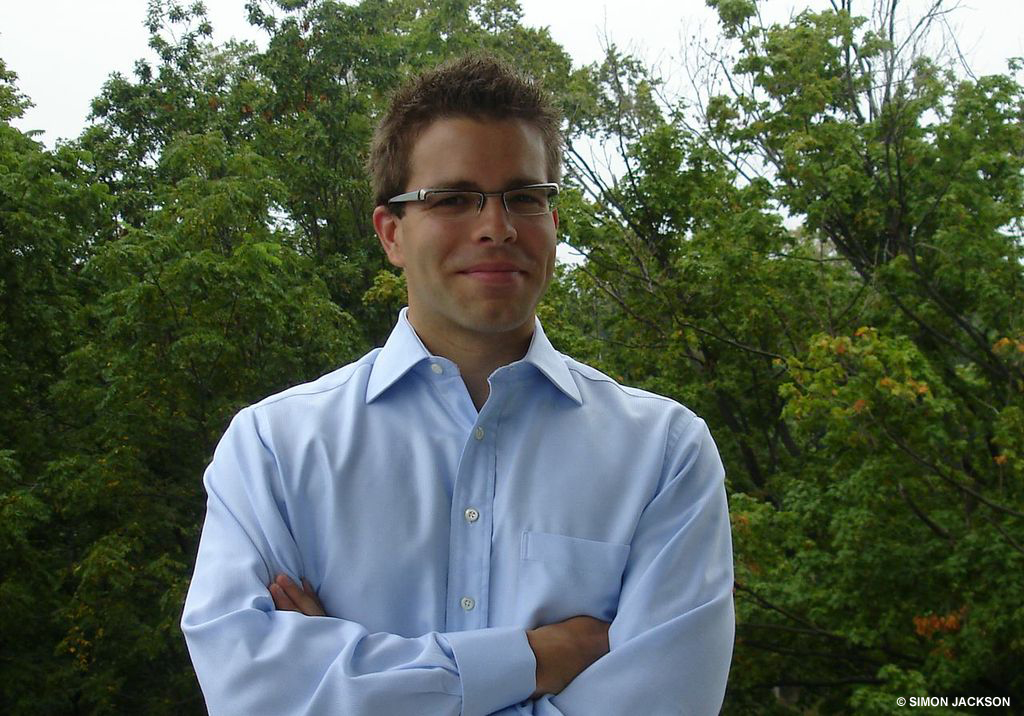
Simon Jackson is the founder and chairman of the Spirit Bear Youth Coalition
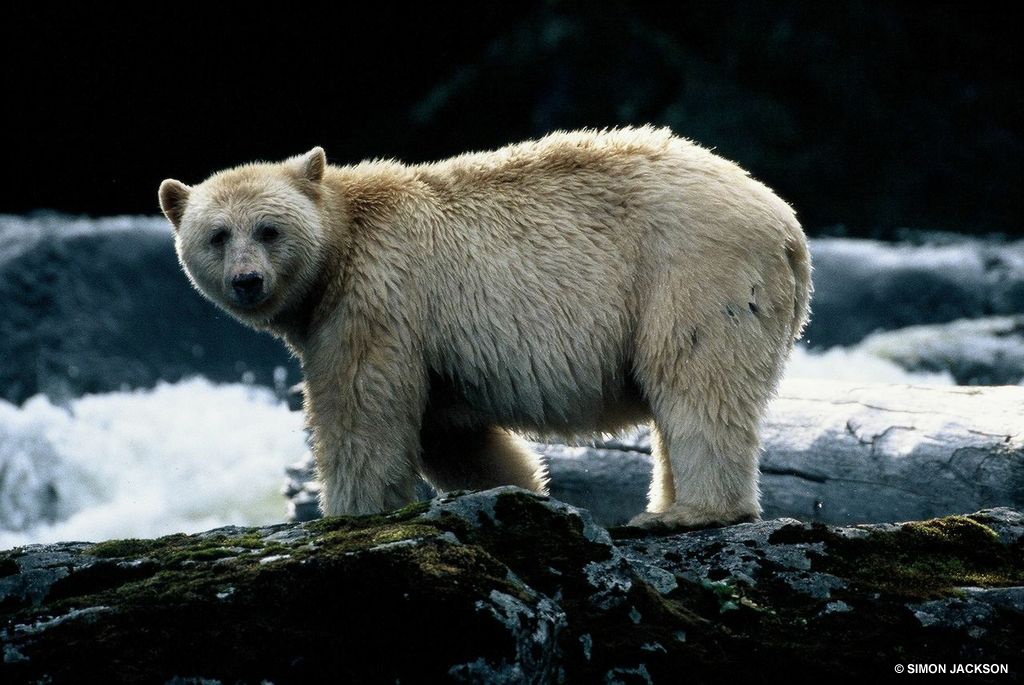
The white Kermode also referred to as a Spirit Bear is becoming extinct with less than four hundred remaining around the world. Photo Credit: Simon Jackson
From the age of seven, Jackson knew he had to protect this unique white bear, of which there were only 200 to 400 on the islands off Canada’s west coast. He founded the Spirit Bear Youth Coalition to help protect the bears from hunting and to preserve the bear’s last remaining rainforest habitat.
What began with 700 hundred letters from a middle school in Vancouver became the most supported conservation initiative in Canadian history.[48. Huffingtonpost. “Simon Jackson: Power of One.” Nov. 13, 2007. www.huffingtonpost.com] Support came in from all over the world and stakeholders, including the Youth Coalition, began working with the BC government to protect coastal rainforest. Today, the Spirit Bear Youth Coalition spans more than 75 countries and enjoys the support of more than 6 million young people. The coalition has helped protect two-thirds of the spirit bear’s last intact habitat (200,000 hectares) in the Great Bear Rainforest.
The Coalition works at being positive, cooperative, engaged and pragmatic. They recognize the importance of working with all levels of decision makers to save the spirit bears and using scientific research and economics to show the need for protection and that it can be accomplished.
“The actions we take today will be our legacy for our future and the Youth Coalition hopes that by helping ensure the future of the remarkable spirit bear, we will have done more than simply save a globally important creature, but equally showcase to young people the world over the power of one – the difference each of us can make for the spirit bear and for any issue that we believe in.” – Spirit Bear Youth Coalition[49. The Spirit Bear Youth Coalition. “Our History.” ]
Defender of the Oceans: Paul Watson

Paul Watson is a founder of the Sea Shepherd Conservation Society
Paul Watson has been a defender of social and environmental issues, whales and all marine life for more than 40 years. He is one of the most important and well-known environmental activists of our time as a founding member and director of Greenpeace, Greenpeace International and a founder of Sea Shepherd Conservation Society – and many other organizations.
Watson risks his life and uses innovative direct-action tactics to investigate, document, and take action; to stop the unnecessary deaths of animals, expose and confront illegal activities on the high seas, and bring global attention to marine crises. For 35 years, Captain Paul Watson has been at the helm of Sea Shepherd Conservation Society, the world’s most active marine non-profit organization. Sea Shepherd researches, investigates and enforces laws, treaties, resolutions and regulations established to protect marine wildlife worldwide by patrolling areas of the ocean and taking direct action when needed.
Watson is at the helm of a global battle to save sharks from the threat of decimation. He also campaigns to stop the Japanese harvesting of whales for research. Sea Shepherd raises awareness and concern for sharks, patrols marine protected areas, exposes corruption/greed, and arrests the criminals who profit from the shark finning industry. Watch Sharkwater to see Revolution filmmaker Rob Stewart and Paul Watson take on the shark-finning mafia.
Although most well-known for his radical activism, Watson has used any number of techniques to raise awareness and get action for marine wildlife and environmental issues—writing news stories and books, representing animal conservation groups (e.g., Royal Society for the Protection of Animals), lecturing at universities around the world, teaching and public speaking.
“People are going to have to get involved because it’s a matter of preservation. If we don’t save the whales and the sharks, we’re not going to save the oceans. And if the oceans die, we die. It’s as simple as that… We’ve got to stop arguing over trivialities and start working on what is most important, which is ultimately the survival of our planet and the survival of ourselves.” – Paul Watson, interview for Mother Nature Network[50. Mother Nature Network. “Paul Watson. Whale Warrior.” May 6, 2009. www.mnn.com]
Paul Watson can be seen in action on Animal Planet’s Whale Wars.
Animal Rights: Ingrid Newkirk

Co-founder and President of PETA, Ingrid Newkirk
Ingrid Newkirk has led the fight against cruelty to animals for more than 30 years – she has been an inspiration and motivating force for millions of others to do the same. Ingrid is an activist, author, public speaker and former law enforcement officer.
As co-founder and president of People for the Ethical Treatment of Animals (PETA), the world’s largest animal rights organization, Newkirk is best known for the animal rights awareness campaigns she organizes that earn massive media coverage and public attention. Newkirk initiated a change in human thinking towards animals: granting animals basic rights, acknowledging that animal suffering is not acceptable for any living creature, and that animals are not ours to use. She reaches politicians, corporations, universities, scientists, industry and everyday people with her message.
Newkirk started PETA to give people ways to change society using the impact of a group of like-minded people, to protest and expose cruel behaviour for the world to judge. People were exposed to new ideas of vegan diets and cruelty-free products and were made aware of animal abuse behind the scenes of laboratories and corporations, such as General Motors’ car-crash testing on animals. PETA has persuaded many companies to go fur-free, including Forever 21, Gap Inc., Calvin Klein, Ralph Lauren, and J.Crew, and now it’s easy to buy personal care products that have not been tested on animals from hundreds of ethical companies, including LUSH, Urban Decay, Paul Mitchell Systems, The Body Shop, and NYX.[51. People for the Ethical Treatment of Animals. “PETA’s Milestones.” www.peta.org]
Because of Newkirk’s work with PETA, abusers have been jailed, facilities closed, tortured animals saved, animal abuse laws have been enacted, products are made without animal testing, some animal products have become less acceptable (e.g., fur) and grocery stores and restaurants offer more vegan food options than ever before. PETA has been a driving force behind many of the largest successes for animal rights in the last 30 years.
Read more of PETA’s work against animal cruelty. www.peta.org
Revealing the Truth: Rachel Carson

Rachel Carson
Rachel Carson is seen as the start of the Environmental Movement, a single woman in the 1960s who took on the chemical industry to save our health. Called an alarmist by some, Carson wrote the book Silent Spring to expose the dangers of the pesticide DDT to humans and their environment. Carson states in her work that human beings were but one part of nature, yet were separated by their power to alter it.[52. The Life and Legacy of Rachel Carson. “Rachel Carson’s Biography.” www.rachelcarson.org]
Carson wrote a book to inspire change and alert readers – books have always had the potential to change the world. Carson was a renowned, best-selling nature author and a former marine biologist with the US Fish and Wildlife Service – her books educated the public about the interconnectedness of all living things.
For 17 years she researched DDT and tried to warn people of the dangers, but her information was so controversial nobody would listen. Her persistent belief that “people had the right to know”[53. New York Times.”Rachel Carson Dies of Cancer: ‘Silent Spring’ Author was 56.” April 15, 1964. Jonathan Leonard. www.nytimes.com] led to her book, Silent Spring, which was meticulously researched and reviewed by experts. Carson challenged what the government, industry and other scientists accepted and made people look at the long-term impacts of short-term benefits.
Silent Spring started a new public awareness that humans could irreversibly change nature and that some “progress” can be so detrimental to our health and our relationship with the environment, that it must be stopped.
‘Man’s attitude toward nature is today critically important simply because we have now acquired a fateful power to alter and destroy nature. But man is a part of nature, and his war against nature is inevitably a war against himself…. we’re challenged as mankind has never been challenged before to prove our maturity and our mastery, not of nature, but of ourselves.’- Rachel Carson, CBS documentary interview[54. New York Times.”Rachel Carson Dies of Cancer: ‘Silent Spring’ Author was 56.” April 15, 1964. Jonathan Leonard. www.nytimes.com]
Carson died in 1964 from breast cancer, awaiting new regulations to protect the health of people and the environment. It wasn’t until 1972 that DDT was banned in the United States.
Friend to Chimps: Jane Goodall

Jane Goodall lecturing about chimpanzees in Hungary
World-renowned primatologist, conservationist, author and UN Messenger of Peace, Jane Goodall has changed our perception by showing us the connection between the chimp species and ours.
Chimpanzees use tools and medicine; hunt; plan; learn; communicate; have compassion, relationships and war; and live in a complex society. Sound familiar? Goodall’s research knocked us off the pedestals we’d put ourselves on, away from nature, and showed us how close we humans are to the species and natural world around us.
Goodall’s personality and engaging discoveries made the environment “entertaining”— and through new stories and movies of her work, brought Africa, endangered species, ethical treatment of animals and habitat conservation into the home and hearts of everyday people.
Goodall has used her work with chimpanzees as a launching point to educate people and engage them in conservation. The shores of Lake Tanganyika, where Goodall first began her chimpanzee studies, is now Tanzania’s Gombe National Park. She is involved with countless environmental organizations, including those she herself has founded. The Jane Goodall Institute promotes healthy ecosystems, sustainable livelihoods and youth engagement – she launched a youth program, Roots & Shoots in 1991. She works with African nations and communities to develop projects that balance human needs and those of nature.
Lecturing most days of the year, Goodall’s message is to recognize your own power and responsibility to affect change through consumer action, lifestyle choices and activism; to do your part to make the world a better place for people, animals, and the environment we all share.
To achieve global peace, we must not only stop fighting each other, but also stop destroying the natural world.’ – Dr. Jane Goodall, accepting appointment as UN Messenger of Peace[55. Jane Goodall Institute. “UN Messenger of Peace.” www.janegoodall.org]

